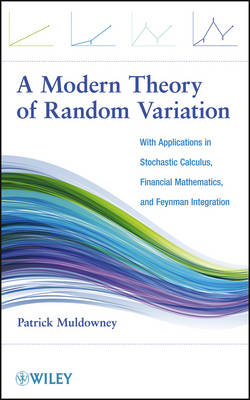
A Modern Theory of Random Variation – With Applications in Stochastic Calculus, Financial Mathematics, and Feynman Integration
Seiten
2012
John Wiley & Sons Inc (Hersteller)
978-1-118-34595-5 (ISBN)
John Wiley & Sons Inc (Hersteller)
978-1-118-34595-5 (ISBN)
- Keine Verlagsinformationen verfügbar
- Artikel merken
With a rigorous theorem-proof approach to stochastic models for financial mathematics as well as a unique focus on Feynman path integration, this book presents the theory of random processes and has applications in numerous areas including applied mathematics and statistics, finance, communication engineering, quantum mechanics, and physics.
This book presents a self-contained study of the Riemann approach to the theory of random variation and assumes only some familiarity with probability or statistical analysis, basic Riemann integration, and mathematical proofs. The author focuses on non-absolute convergence in conjunction with random variation. Any conception or understanding of the random variation phenomenon hinges on the notions of probability and its mathematical representation in the form of probability distribution functions. The central and recurring theme throughout this book is that, provided the use a non-absolute method of summation, every finitely additive, function of disjoint intervals is integrable. In contrast, more traditional methods in probability theory exclude significant classes of such functions whose integrability cannot be established whenever only absolute convergence is considered. An examples includes the Feynman "measure-which-is-not-a-measure" - the so-called probability amplitudes used in the Feynman path integrals of quantum mechanics.
This book presents a framework in which the Feynman path integrals are actual integrals, and they are utilized to express Feynman diagrams as convergent series of integrals. Important classes of stochastic processes, including Brownian motion, are defined by the properties of the increments of the process at successive instants of time. Since the presented method of summation (or integration) is non-absolute, the stochastic calculus of Brownian motion is significantly simplified. The author's study of random variation also includes the definition that the measurability of the variables is a consequence and not a pre-condition of the definition. Also, in place of probability measure functions, the more fundamental role is taken by distribution functions, defined not on measurable sets, but on intervals. These amendments to the classical foundation of probability theory allow for the Feynman theory of the path integral of quantum mechanics to be within the scope of the theory of random variation as well as aids in the simplification of the theory of stochastic calculus.
This book presents a self-contained study of the Riemann approach to the theory of random variation and assumes only some familiarity with probability or statistical analysis, basic Riemann integration, and mathematical proofs. The author focuses on non-absolute convergence in conjunction with random variation. Any conception or understanding of the random variation phenomenon hinges on the notions of probability and its mathematical representation in the form of probability distribution functions. The central and recurring theme throughout this book is that, provided the use a non-absolute method of summation, every finitely additive, function of disjoint intervals is integrable. In contrast, more traditional methods in probability theory exclude significant classes of such functions whose integrability cannot be established whenever only absolute convergence is considered. An examples includes the Feynman "measure-which-is-not-a-measure" - the so-called probability amplitudes used in the Feynman path integrals of quantum mechanics.
This book presents a framework in which the Feynman path integrals are actual integrals, and they are utilized to express Feynman diagrams as convergent series of integrals. Important classes of stochastic processes, including Brownian motion, are defined by the properties of the increments of the process at successive instants of time. Since the presented method of summation (or integration) is non-absolute, the stochastic calculus of Brownian motion is significantly simplified. The author's study of random variation also includes the definition that the measurability of the variables is a consequence and not a pre-condition of the definition. Also, in place of probability measure functions, the more fundamental role is taken by distribution functions, defined not on measurable sets, but on intervals. These amendments to the classical foundation of probability theory allow for the Feynman theory of the path integral of quantum mechanics to be within the scope of the theory of random variation as well as aids in the simplification of the theory of stochastic calculus.
PATRICK MULDOWNEY, PhD, served as lecturer in the Magee Business School at the University of Ulster for over twenty years. Dr. Muldowney has published extensively in his areas of research, including integration theory, financial mathematics, and random variation.
1. Prologue 1 2. Introduction 29 3. Infinite-dimensional Integration 69 4. Theory of the Integral 95 5. Random Variability 161 6. Gaussian Integrals 233 7. Brownian Motion 277 8. Stochastic Integration 349 9. Numerical Calculation 411 10. Appendix 455
| Erscheint lt. Verlag | 12.11.2012 |
|---|---|
| Verlagsort | New York |
| Sprache | englisch |
| Maße | 138 x 216 mm |
| Gewicht | 4022 g |
| Themenwelt | Mathematik / Informatik ► Mathematik |
| Naturwissenschaften ► Physik / Astronomie ► Quantenphysik | |
| ISBN-10 | 1-118-34595-9 / 1118345959 |
| ISBN-13 | 978-1-118-34595-5 / 9781118345955 |
| Zustand | Neuware |
| Haben Sie eine Frage zum Produkt? |